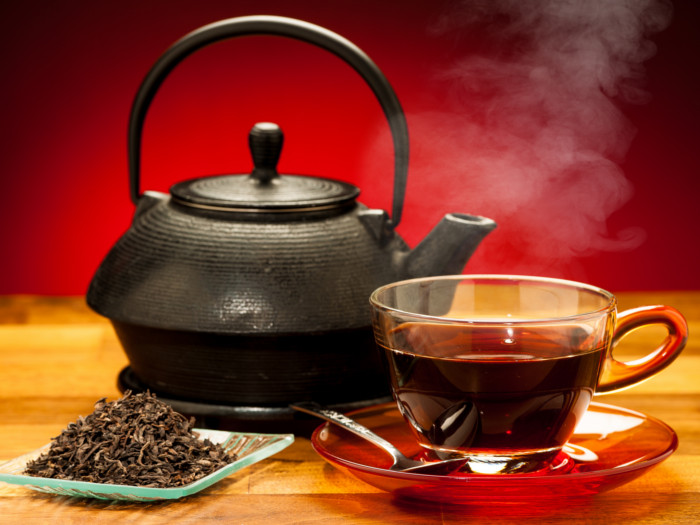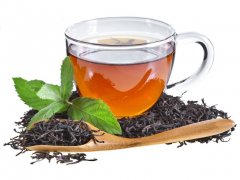What are the effects of drinking black tea on your health? Is black tea calming or refreshing?
Nutrition of black tea
It is rich in antioxidants such as polyphenols and catechins. Its oxidation capacity exceeds that of oolong tea, white tea and green tea. The main antioxidant compounds in tea are theaflavins, lycopene and catechins. These antioxidants are the main healthy ingredients of black tea. Because people who regularly drink black tea drink it every day, the efficacy of black tea will be enhanced. [3]
Unsweetened tea contains almost no calories and is low in sodium, protein and carbohydrates. Black tea has a strong flavor and is more oxidizing, so it is more healthy than oolong tea, white tea or green tea.
Caffeine in black tea
Like other teas, black tea contains caffeine. According to the United States Department of Agriculture, a cup (240 grams) of hot brewed tea contains 48 milligrams of caffeine. It should be noted that the amount of caffeine also depends on the brewing time and the processing process. So the brand you buy will also have an impact. By contrast, the same amount of green tea contains 28.8 milligrams of caffeine. Coffee contains twice as much caffeine as regular coffee, with an average cup of coffee containing at least 96 milligrams of caffeine.
For a clearer comparison, read our article "caffeine in Tea or Coffee: which is healthier". To better understand the role of caffeine, read caffeine in tea: 12 surprising facts.
Health benefits of black tea
This magical tea is famous for its curative effect and other health benefits. The most powerful benefits are:
May be rich in antioxidants
It is well known that black tea is rich in antioxidants. Polyphenols such as theaflavins, theaflavins and catechins are the main components of black tea, and they may play an antioxidant role. The antioxidant properties of tea may help inhibit the production of free radicals, scavenge free radicals, and help protect your cells from DNA damage.
Black tea is rich in catechins and theaflavins, according to a study published in the British Journal of Pharmacology (British Journal of Pharmacology) in 2017. These antioxidants are the reason for many beneficial properties of black tea. Drinking black tea regularly can regulate people's antioxidant capacity. It is beneficial to overall health and even helps to prevent or control chronic diseases.

Prevention of heart disease
Black tea may contain large amounts of flavanols, flavonols, theaflavins and Gallic acid derivatives, which can help repair coronary artery dysfunction in patients with heart disease. It may also reverse vascular dysfunction, leading to stroke, atherosclerosis and other cardiovascular diseases. Several studies have shown that black tea can help reduce the risk of cardiovascular disease. Drinking black tea regularly can reduce cardiovascular disease and mortality, according to a study published in the Journal of the American Heart Association. Similarly, another study shows that black tea can reduce the risk of heart disease.
Drinking tea can reduce the risk of fatal or non-fatal strokes. A study published in the Journal of the American Heart Association (American Heart Association journal Stroke) reviewed nine studies involving 4378 cases of ischemic stroke and found that people who drank three or more cups of tea a day had a 21% lower risk of stroke than those who drank less than one cup of tea a day.
Help to control diabetes
Long-term drinking tea can reduce the level of fasting blood glucose and reduce the incidence of type 2 diabetes. The main bioactive compound in black tea is tea polyphenols, which can reduce glycemic index. Regular tea drinking has antioxidant and anti-inflammatory effects on patients with type 2 diabetes, according to a study published in the Annals of Nutrition and Metabolism (Annals of Nutrition & Metabolism).
Can prevent stroke.
Drinking more than one cup of black or green tea a day can help prevent ischemic stroke.
Can improve digestion.
Black tea is rich in tannins and other chemicals, which may have a positive and relaxing effect on the body's digestive system. The anti-inflammatory properties of this tea also help to treat digestive diseases. Animal studies have shown that the compounds in this tea can also fight stomach ulcers.
Possible antibacterial activity
Tea polyphenols are famous for their antibacterial activity. Studies have shown that black tea can reduce the risk of Helicobacter pylori infection. Tea's potential antibacterial properties make it convenient to find family treatments, whether to treat foot odor or relieve burns and rashes. If your feet smell bad, soak them in a strong black tea bath for 30 minutes. Similarly, use chilled tea bags to relieve inflammation.
It can relieve stress.
When we were growing up, most of us heard about the magical effects of black tea on relaxation and refreshing. Now studies have confirmed the stress-reducing properties of this tea. In an article published in the journal Nature, the authors found through different studies that tea has the ability to improve mood and may even be beneficial to people with mental illness. Its key components are considered to be l-theanine and EGCG in black tea. They either work alone or in combination with caffeine to improve our mood.
Drinking black tea helps people recover more quickly from stressful tasks, a study has found. Compared with a placebo containing caffeine, it reduced post-stress cortisol and showed greater relaxation among test participants.
Improve oral health
The polyphenols in black tea include catechins, flavonoids and tannins, which may have bacteriostatic and inhibitory effects on bacteria and salivary enzymes. Drinking one or two cups of sugar-free tea a day can reduce inflammation, prevent tooth decay and prevent the growth of oral bacteria.

May increase bone mineral density.
Black tea is thought to increase bone mineral density. Older women who are prone to fractures have a lower risk of fracture-related hospitalization when drinking black tea because black tea contains special types of flavonoids, according to a study. People are also less likely to develop arthritis because of the phytochemicals found in this popular drink. The American Arthritis Foundation adds tea to the list of recommended drinks for patients with arthritis.
Can prevent Parkinson's disease.
New evidence suggests that black tea can prevent the development of Parkinson's disease. The reason for this ability seems unclear and often contradictory. Some studies attribute it to caffeine in black tea. This risk reduction seems to be related to smokers and men (not women). However, a health study in Singapore found that black tea had a similar effect, speculating that the effect came from ingredients that had nothing to do with caffeine. However, another study attributed this ability to the powerful polyphenols found in black tea. Whatever the reason, all these studies agree that black tea has the potential to prevent Parkinson's disease. [25] [26] [27]
May increase alertness.
The caffeine in black tea is considered to be a mental stimulant that increases alertness and performance. A review published in the American Journal of Clinical Nutrition (The American Journal of Clinical Nutrition) found that four studies examined the relationship between tea and alertness. Black tea has been found to improve efficacy and accuracy immediately after drinking.
Can help with skin and hair care.
Black tea is used to treat skin and hair-related problems in many cultures. Black tea is used in family treatments such as facial masks, hair bags, and relieving eye bags. Emerging evidence suggests that effective polyphenols and catechins in black tea may help solve skin and hair care problems. A review of tea extracts in cosmetics published in the journal Molecular in 2019 found that the catechins in tea are responsible for anti-aging, photoprotection and antioxidant properties.
Studies have shown that drinking tea regularly can even prevent skin carcinogens. It can also prevent carcinogens induced by UVB rays.
It can improve immunity.
Finally, all this evidence suggests that regular consumption of black tea helps boost immunity. In vitro studies have shown that black tea helps to improve the immune pathway. This can be attributed to the polyphenols in tea, which can help prevent disease and strengthen the immune system from within.
Black tea can not only resist bacteria, but also strengthen the immune system. This hot drink is rich in antioxidants, which can prevent DNA damage by scavenging free radicals.
May help you lose weight
For those who want to lose weight, unsweetened black tea may be the drink of choice. Many studies have shown that black tea can help you lose weight. A study from the University of California, Los Angeles found that black tea can help us lose weight by changing our energy metabolism by changing bacteria in the gut. A 2018 study attributed weight loss properties to the presence of theaflavins in black tea. Studies have found that fully fermented tea, such as black tea, is as effective as green tea in losing weight.
Important Notice :
前街咖啡 FrontStreet Coffee has moved to new addredd:
FrontStreet Coffee Address: 315,Donghua East Road,GuangZhou
Tel:020 38364473
- Prev

What kind of tea is Earl Grey tea? What are the benefits of drinking Earl black tea? How does black tea taste good?
Recently, some of my senior tea friends talked about Earl Grey Tea, especially Earl Grey Tea No. 69. If you have never tried or tried Earl Grey Tea before, it must have a fanatical following. Believe me. People reacted strongly to this. Is it bergamot? A catchy name? I'm digging here, so keep reading and learn more! First of all, let me
- Next

The process of smoking with pine smoke in the production of Zhengshan race explains in detail what brand is good for Zhengshan race.
Tea and smoke equals Zhengshan race, right? Yeah, a little bit. This indescribable smoked tea is a unique product in the world! It is unique in tea. Of course, each kind of good tea has its own unique processing method, which makes it a unique tea, and Zhengshan race does have its own, very special mode of production. But this special tea is only produced in Wuyi Mountain, China.
Related
- Unexpected! Ruixing Telunsu lattes use a smoothie machine to foam milk?!
- % Arabia's first store in Henan opens into the village?! Netizen: Thought it was P's
- Does an authentic standard mocha coffee recipe use chocolate sauce or powder? Mocha Latte/Dirty Coffee/Salty Mocha Coffee Recipe Share!
- What is the difference between Vietnam egg coffee and Norway egg coffee? Hand-brewed single product coffee filter paper filter cloth filter flat solution!
- What is the difference between sun-cured and honey-treated coffee? What are the differences in the flavor characteristics of sun-honey coffee?
- How to make Italian latte! How much milk does a standard latte use/what should the ratio of coffee to milk be?
- How to make butter American/butter latte/butter Dirty coffee? Is hand-brewed coffee good with butter?
- Is Dirty the cold version of Australian White? What is the difference between dirty coffee/decent coffee and Australian white espresso?
- Relationship between brewing time and coffee extraction parameters How to make the brewing time fall to 2 minutes?
- Got entangled?! Lucky opens a new store, Mixue Ice City, and pursues it as a neighbor!

